15 july 2015
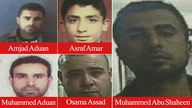
Shooter, a member of the PA's elite Force 17 unit, arrested after calling police and boasting of attack; four other accomplices also arrested.
Israeli security forces arrested the terrorist who killed Israeli hiker Danny Gonen near the settlement Dolev in the West Bank, along with four other suspects, it was cleared for publication on Wednesday.
The shooter was identified as Muhammed Abu Shaheen, 30 years old from Qalandiya, is a member of the Palestinian Authority's elite Force 17 unit. He was imprisoned between 2006-2008 after confessing his intention to carry out a terror attack.
During questioning, Abu Shaheen confessed to the shooting and said he had collected intelligence before committing the attack. He also admitted to six other shooting attacks in the last year, including one in November 2014 in Al-Ram, in which a soldier was wounded.
The five were arrested about a week and a half after the attack, when troops raided the suspects' homes.
According to investigators, there was no connection between the arrested cell members and the cell that committed the terror attack near Shvut Rachel, in which Israeli Malachi Rosenfeld was killed, or the shooting at an ambulance near Beit El. However, the Shin Bet reportedly made new discoveries about those attacks over the last few days.
Aharon Gonen, Danny's uncle, said he had spoken to the victim's mother and that the arrests had brought back very difficult emotions. "She is still upset," he said. "Every development or event causes a flood of emotions and brings up all the thoughts and longing again. We never for a moment doubted that security forces would get their hands on the terrorists, and we also knew it could take days, weeks, or month."
Gonen said the family was told earlier in the week that progress has been made in the case and that Palestinian suspects have been arrested.
The attack took place on June 19, when Gonen and a friend were driving away from a spring near the Dolev settlement in the Binyamin area of the West Bank. A Palestinian man signaled for them to stop as if to ask for help before firing at them from point-blank range, critically wounding Gonen.
The case reached a turning point when the Judea and Samaria District emergency center received a call from the attacker, saying he committed a terror attack and shot Israelis. The Shin Bet then traced the call, leading them to Qalandiya. One of the arrestees was Amjad Aduan, 35, who was previously detained for planning terror attacks. He is suspected of supplying Abu Shaheen with ammunition and served as a lookout at several shooting attacks.
The other suspects who were arrested are Asraf Amar, a 24-year-old member of PA military Intelligence, Fatah member Osama Assad, 29, who was released in the Shalit deal and is suspected of hiding the gun that Abu Shaheen used for the attack in his home; and Muhammed Aduan, 37, who has no history of security offenses, who is also suspected of hiding weapons for Abu Shaheen.
The terror cell belongs to the Tanzim militia founded by Fatah, which has been working to rebuild its infrastructure in the West Bank over the past year. These are young terror operatives, who do not answer to Fatah or the Palestinian Authority.
Israeli security forces arrested the terrorist who killed Israeli hiker Danny Gonen near the settlement Dolev in the West Bank, along with four other suspects, it was cleared for publication on Wednesday.
The shooter was identified as Muhammed Abu Shaheen, 30 years old from Qalandiya, is a member of the Palestinian Authority's elite Force 17 unit. He was imprisoned between 2006-2008 after confessing his intention to carry out a terror attack.
During questioning, Abu Shaheen confessed to the shooting and said he had collected intelligence before committing the attack. He also admitted to six other shooting attacks in the last year, including one in November 2014 in Al-Ram, in which a soldier was wounded.
The five were arrested about a week and a half after the attack, when troops raided the suspects' homes.
According to investigators, there was no connection between the arrested cell members and the cell that committed the terror attack near Shvut Rachel, in which Israeli Malachi Rosenfeld was killed, or the shooting at an ambulance near Beit El. However, the Shin Bet reportedly made new discoveries about those attacks over the last few days.
Aharon Gonen, Danny's uncle, said he had spoken to the victim's mother and that the arrests had brought back very difficult emotions. "She is still upset," he said. "Every development or event causes a flood of emotions and brings up all the thoughts and longing again. We never for a moment doubted that security forces would get their hands on the terrorists, and we also knew it could take days, weeks, or month."
Gonen said the family was told earlier in the week that progress has been made in the case and that Palestinian suspects have been arrested.
The attack took place on June 19, when Gonen and a friend were driving away from a spring near the Dolev settlement in the Binyamin area of the West Bank. A Palestinian man signaled for them to stop as if to ask for help before firing at them from point-blank range, critically wounding Gonen.
The case reached a turning point when the Judea and Samaria District emergency center received a call from the attacker, saying he committed a terror attack and shot Israelis. The Shin Bet then traced the call, leading them to Qalandiya. One of the arrestees was Amjad Aduan, 35, who was previously detained for planning terror attacks. He is suspected of supplying Abu Shaheen with ammunition and served as a lookout at several shooting attacks.
The other suspects who were arrested are Asraf Amar, a 24-year-old member of PA military Intelligence, Fatah member Osama Assad, 29, who was released in the Shalit deal and is suspected of hiding the gun that Abu Shaheen used for the attack in his home; and Muhammed Aduan, 37, who has no history of security offenses, who is also suspected of hiding weapons for Abu Shaheen.
The terror cell belongs to the Tanzim militia founded by Fatah, which has been working to rebuild its infrastructure in the West Bank over the past year. These are young terror operatives, who do not answer to Fatah or the Palestinian Authority.

Hamas spokesman Sami Abu Zuhri slammed on Tuesday the remarks made by UN Secretary General Ban Ki-Moon in which he called on Hamas to release the “Israeli captives”, labeling them as biased and repulsive.
Abu Zuhri added that such remarks prove that Ban Ki-moon is nothing but a tool serving the Israeli interests.
The Hamas official said that before talking about the Israeli murderous soldiers, the international community must act to end the tragedy of six thousand Palestinian detainees held in the Israeli occupation prisons.
Last month, UN’s Ban Ki-moon caved in to Israeli pressure and took Israel off list of serious child abusers. Israel murdered more than 550 children in the past year.
Abu Zuhri added that such remarks prove that Ban Ki-moon is nothing but a tool serving the Israeli interests.
The Hamas official said that before talking about the Israeli murderous soldiers, the international community must act to end the tragedy of six thousand Palestinian detainees held in the Israeli occupation prisons.
Last month, UN’s Ban Ki-moon caved in to Israeli pressure and took Israel off list of serious child abusers. Israel murdered more than 550 children in the past year.
14 july 2015
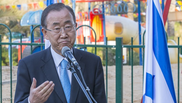
Ban Ki-moon, UN spokesperson call for 'prompt action' to return missing Ethiopian Israeli, Bedouin to families.
UN Secretary-General Ban Ki-moon on Monday called on Palestinians in Gaza with knowledge of two missing Israeli civilians to provide information about their possible whereabouts and conditions.
UN spokesman Stephane Dujarric said the secretary-general also called for prompt action to facilitate their safe return to their families.
Israeli defense officials identified one of the men as Avraham Mangisto, an Israeli of Ethiopian descent in his late 20s who disappeared after he "independently" entered Gaza on Sept. 7, 2014, two weeks after the end of Israel's war with Hamas.
Israel said the second man was a Bedouin Arab citizen from southern Israel but refused to identify him or say how long he had been in Gaza or how he got there. Dujarric said "the secretary-general underscores the responsibility of all parties to protect and respect the rights of civilians."
He said the United Nations will continue to closely monitor developments. Last week's announcement that the two Israelis are missing brought back bitter memories of the case of Israeli soldier Gilad Schalit, who was captured and imprisoned for five years by Hamas. But circumstances have changed dramatically since Schalit's release in a 2011 prisoner swap.
Israeli observers say what happens to the two missing civilians could provide an important test of a new fragile detente that has emerged between Israel and Hamas since last year's devastating war.
Israeli Prime Minister Benjamin Netanyahu said last week he held Hamas, which has ruled Gaza since 2007, responsible for the fate of both men. He said Israel is working to free them.
UN Secretary-General Ban Ki-moon on Monday called on Palestinians in Gaza with knowledge of two missing Israeli civilians to provide information about their possible whereabouts and conditions.
UN spokesman Stephane Dujarric said the secretary-general also called for prompt action to facilitate their safe return to their families.
Israeli defense officials identified one of the men as Avraham Mangisto, an Israeli of Ethiopian descent in his late 20s who disappeared after he "independently" entered Gaza on Sept. 7, 2014, two weeks after the end of Israel's war with Hamas.
Israel said the second man was a Bedouin Arab citizen from southern Israel but refused to identify him or say how long he had been in Gaza or how he got there. Dujarric said "the secretary-general underscores the responsibility of all parties to protect and respect the rights of civilians."
He said the United Nations will continue to closely monitor developments. Last week's announcement that the two Israelis are missing brought back bitter memories of the case of Israeli soldier Gilad Schalit, who was captured and imprisoned for five years by Hamas. But circumstances have changed dramatically since Schalit's release in a 2011 prisoner swap.
Israeli observers say what happens to the two missing civilians could provide an important test of a new fragile detente that has emerged between Israel and Hamas since last year's devastating war.
Israeli Prime Minister Benjamin Netanyahu said last week he held Hamas, which has ruled Gaza since 2007, responsible for the fate of both men. He said Israel is working to free them.
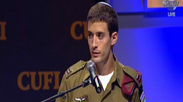
Tzur Goldin pleads with Evangelical Christians to help him bring his twin brother, kidnapped by Hamas in Gaza, to Israel for burial; he also calls for the reconstruction of Gaza.
Tzur Goldin, whose brother Hadar Goldin was killed in Gaza and then captured by Hamas, made an emotional plea to pro-Israel Evangelical Christians on Monday night, urging them to help him bring his brother to burial in Israel.
"I am Tzur Goldin, twin brother to 1st.-Lt. Hadar Goldin. Hadar Goldin was killed and kidnapped by Hamas terrorists and whose dead body is being held ransom inside Gaza. I am here today to bring my brother home," he said at a conference in Washington. Alongside his plea for the return of his brother, Goldin urged his listeners to raise their voice and call for the reconstruction of Gaza, which suffered intensive damage during the 50-days of fighting last summer.
"Like me, Hadar Goldin was an officer in the special forces of the IDF. Like me, Hadar Goldin was a commander of Israel's sons. Like me, Hadar knew combat from a very young age. Like me, Hadar went forward not to conquer another people, but to bring safety to his own people. But unlike me, Hadar Goldin never returned from his last battle," Tzur continued. He said both he and his twin brother believed in courage and humility - two words the two hand-stitched onto their rifle straps. "Courage and humility are what he carried into the battle field of Operation Protective Edge last summer. Hadar served at the tip of the spear of all forces during our defensive operation inside Gaza. He did it with courage, and with humility."
The opposite of these positive qualities are cowardice and depravity, which Tzur described as "the hallmarks of the crimes carried against my brother Hadar, my parents, my family, our soldiers, and all the house of Israel." During last summer's war in Gaza, he recounted, after three weeks of blood and sacrifice, Israel agreed to a ceasefire requested by the US. "It was Friday, August the 1st, 2014," he said.
"The end of war brings with it a certain sense of relief. Mine was short-lived. A mere 13 minutes after learning of the ceasefire, I received direct orders with the following update: Hamas had launched an ambush against three of our soldiers, despite the ceasefire. Two of the soldiers had been killed. The third soldier had been kidnapped.
The kidnapped soldier was my brother, Hadar Goldin. Hadar was kidnapped by way of an ambush that exploited the goodness of our soldiers and demonstrated the depravity of Hamas. The terrorists dragged the body of my dead brother below ground into a tunnel from which he has never been redeemed, plunging him and my family from the light into a darkness from which I, my family, my nation, are determined to emerge."
Goldin said that "what Hamas terrorists did and are doing by holding my brother's body, is a crime. It is an outrage against humanity. And I'm not going to accept it. I reject it, and all good people must reject it with me." He called on "all people of conscience, all people who value human life, whether they be Israeli or American, Jewish or Christian, or of no faith whatsoever" to "fight against this evil," and was met with roaring applause.
He slammed Hamas' "cynical demands" in return for the release of his brother's body, adding "we have demands too." "I come here to deliver a message today to all who will listen," Goldin said.
"It is a message directly from the parents of Hadar to every parent in this room and beyond. The body of Hadar Goldin must be returned to his family," he said to continuous applause.
The 24-year-old said his twin brother's death turned him into a much older man, quoting from Psalms 37:25, "I have been young, and now am old; Yet have I not seen the righteous forsaken."
He went on to say that his brother "was the definition of a righteous man," pleading "Please help me to ensure that he shall never ever be abandoned."
Tzur Goldin, whose brother Hadar Goldin was killed in Gaza and then captured by Hamas, made an emotional plea to pro-Israel Evangelical Christians on Monday night, urging them to help him bring his brother to burial in Israel.
"I am Tzur Goldin, twin brother to 1st.-Lt. Hadar Goldin. Hadar Goldin was killed and kidnapped by Hamas terrorists and whose dead body is being held ransom inside Gaza. I am here today to bring my brother home," he said at a conference in Washington. Alongside his plea for the return of his brother, Goldin urged his listeners to raise their voice and call for the reconstruction of Gaza, which suffered intensive damage during the 50-days of fighting last summer.
"Like me, Hadar Goldin was an officer in the special forces of the IDF. Like me, Hadar Goldin was a commander of Israel's sons. Like me, Hadar knew combat from a very young age. Like me, Hadar went forward not to conquer another people, but to bring safety to his own people. But unlike me, Hadar Goldin never returned from his last battle," Tzur continued. He said both he and his twin brother believed in courage and humility - two words the two hand-stitched onto their rifle straps. "Courage and humility are what he carried into the battle field of Operation Protective Edge last summer. Hadar served at the tip of the spear of all forces during our defensive operation inside Gaza. He did it with courage, and with humility."
The opposite of these positive qualities are cowardice and depravity, which Tzur described as "the hallmarks of the crimes carried against my brother Hadar, my parents, my family, our soldiers, and all the house of Israel." During last summer's war in Gaza, he recounted, after three weeks of blood and sacrifice, Israel agreed to a ceasefire requested by the US. "It was Friday, August the 1st, 2014," he said.
"The end of war brings with it a certain sense of relief. Mine was short-lived. A mere 13 minutes after learning of the ceasefire, I received direct orders with the following update: Hamas had launched an ambush against three of our soldiers, despite the ceasefire. Two of the soldiers had been killed. The third soldier had been kidnapped.
The kidnapped soldier was my brother, Hadar Goldin. Hadar was kidnapped by way of an ambush that exploited the goodness of our soldiers and demonstrated the depravity of Hamas. The terrorists dragged the body of my dead brother below ground into a tunnel from which he has never been redeemed, plunging him and my family from the light into a darkness from which I, my family, my nation, are determined to emerge."
Goldin said that "what Hamas terrorists did and are doing by holding my brother's body, is a crime. It is an outrage against humanity. And I'm not going to accept it. I reject it, and all good people must reject it with me." He called on "all people of conscience, all people who value human life, whether they be Israeli or American, Jewish or Christian, or of no faith whatsoever" to "fight against this evil," and was met with roaring applause.
He slammed Hamas' "cynical demands" in return for the release of his brother's body, adding "we have demands too." "I come here to deliver a message today to all who will listen," Goldin said.
"It is a message directly from the parents of Hadar to every parent in this room and beyond. The body of Hadar Goldin must be returned to his family," he said to continuous applause.
The 24-year-old said his twin brother's death turned him into a much older man, quoting from Psalms 37:25, "I have been young, and now am old; Yet have I not seen the righteous forsaken."
He went on to say that his brother "was the definition of a righteous man," pleading "Please help me to ensure that he shall never ever be abandoned."
13 july 2015
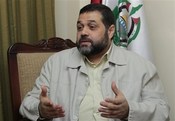
Information or negotiations as regards Israeli captives held by Hamas will be in exchange for another batch of Palestinian prisoners, Hamas foreign affairs chief said.
In an interview with Al Resalah, Osama Hamdan, head of Hamas's foreign affairs department, said that the group has not discussed the number of prisoners it is holding or their condition until now, and as a result forced Israel in the end to admit that captives are held by Hamas.
Hamdan said there was no contact between Hamas and the Israeli occupation regarding the captive Israelis.
He said that Israel is trying to gain scraps of information about the abducted Israelis via international intermediaries who have contacted Hamas on the issue.
Hamdan said Hamas's conditions for holding indirect negotiations on the abducted Israelis include having Israel fully admit the number of missing soldiers, as well as the release of the recaptured batch of Palestinian detainees.
He called on Israel to publicize the number of captives it knew were held by Hamas.
Hamdan emphasized that a negotiation on the prisoners is unrelated to the topic of a ceasefire with Israel, and he also negated reports in the Israeli press that talks had been held between Israel and Hamas regarding the abducted Israelis.
He said the group had “more bargaining chips that have not yet become public and which the Israelis will never dare disclose.”
In an interview with Al Resalah, Osama Hamdan, head of Hamas's foreign affairs department, said that the group has not discussed the number of prisoners it is holding or their condition until now, and as a result forced Israel in the end to admit that captives are held by Hamas.
Hamdan said there was no contact between Hamas and the Israeli occupation regarding the captive Israelis.
He said that Israel is trying to gain scraps of information about the abducted Israelis via international intermediaries who have contacted Hamas on the issue.
Hamdan said Hamas's conditions for holding indirect negotiations on the abducted Israelis include having Israel fully admit the number of missing soldiers, as well as the release of the recaptured batch of Palestinian detainees.
He called on Israel to publicize the number of captives it knew were held by Hamas.
Hamdan emphasized that a negotiation on the prisoners is unrelated to the topic of a ceasefire with Israel, and he also negated reports in the Israeli press that talks had been held between Israel and Hamas regarding the abducted Israelis.
He said the group had “more bargaining chips that have not yet become public and which the Israelis will never dare disclose.”
12 july 2015

Israeli newspaper Yade’out Ahrenout said this morning that former Quartet Committee envoy and former British Prime Minister, Tony Blair, is leading the negotiations between Israel and Hamas with the aim of knowing the fate of the two Israeli detainees who were arrested by Hamas in Gaza 10 months ago.
The newspaper quoted Russian newspaper Spotinic’s report saying that Blair was currently the first and only mediator between Hamas and Israel in their negotiations to gain knowledge on the state and whereabouts of the two Israeli citizens.
According to Spotinic’s report, Blair’s focus is firstly on understanding the fate of Ephrahem Mengistu and the second detainee, a Bedouin man. It pointed out that Blair had officially met with the Hamas leadership in order to discuss this issue and to attempt to make a first step towards a solution.
Sources in Hamas denied reports that Germany was one of the mediators in the negotiations.
It should be noted that Tony Blair met at least two times recently with Hamas leader Khaled Mesha’al in Qatar’s capital city, Doha.
Hamas has denied holding the two Israeli men, saying that the movement had released them into Israel after the discovery that the two citizens were not soldiers. Israel rejected this statement and said that all indications lead to the conclusion that at least Mengistu was still in Hamas’ custody.
UPDATE: An Israeli official has stated that Israel will not take part in any negotiations with Hamas, according to Haaretz newspaper.
The newspaper quoted Russian newspaper Spotinic’s report saying that Blair was currently the first and only mediator between Hamas and Israel in their negotiations to gain knowledge on the state and whereabouts of the two Israeli citizens.
According to Spotinic’s report, Blair’s focus is firstly on understanding the fate of Ephrahem Mengistu and the second detainee, a Bedouin man. It pointed out that Blair had officially met with the Hamas leadership in order to discuss this issue and to attempt to make a first step towards a solution.
Sources in Hamas denied reports that Germany was one of the mediators in the negotiations.
It should be noted that Tony Blair met at least two times recently with Hamas leader Khaled Mesha’al in Qatar’s capital city, Doha.
Hamas has denied holding the two Israeli men, saying that the movement had released them into Israel after the discovery that the two citizens were not soldiers. Israel rejected this statement and said that all indications lead to the conclusion that at least Mengistu was still in Hamas’ custody.
UPDATE: An Israeli official has stated that Israel will not take part in any negotiations with Hamas, according to Haaretz newspaper.
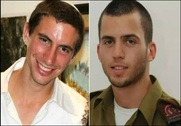
An Israeli newspaper has revealed that the German intelligence agency has been since a while in the process of studying Hamas's positions as a prelude to its mediation in a new Palestinian-Israeli swap deal.
The Hebrew newspaper Makor Rishon pointed out to the "important" efforts that had been made by the German intelligence in the 2011 prisoner swap deal between Hamas and the Israeli government, asserting that the Germans are willingness once again to broker a new one.
For its part, Yedioth Ahronoth newspaper said on Saturday that the growing public pressure on Israeli premier Benjamin Netanyahu regarding the Israelis held captive by Hamas in Gaza pushed him last Friday to visit the family of Israeli-Ethiopian soldier Avraham Mengistu.
Mengistu's family expressed their belief in recent press remarks that its son's disappearance and capture by Hamas would have been treated far differently if he had not been of African descent.
In recent months, Ethiopian Jews have staged massive rallies to protest what they call their exposure to racist treatment by the Israeli police and society.
The Hebrew newspaper Makor Rishon pointed out to the "important" efforts that had been made by the German intelligence in the 2011 prisoner swap deal between Hamas and the Israeli government, asserting that the Germans are willingness once again to broker a new one.
For its part, Yedioth Ahronoth newspaper said on Saturday that the growing public pressure on Israeli premier Benjamin Netanyahu regarding the Israelis held captive by Hamas in Gaza pushed him last Friday to visit the family of Israeli-Ethiopian soldier Avraham Mengistu.
Mengistu's family expressed their belief in recent press remarks that its son's disappearance and capture by Hamas would have been treated far differently if he had not been of African descent.
In recent months, Ethiopian Jews have staged massive rallies to protest what they call their exposure to racist treatment by the Israeli police and society.
11 july 2015
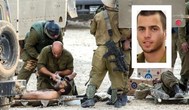
By Khalid Amayreh in Occupied Palestine
Israel has finally officially acknowledged that two Israelis were being held in the Gaza Strip, presumably in Hamas's custody.
Israel had hoped that Hamas would disclose information on the matter, which would help Israel repatriate the two men in return for a non-costly price or at no price at all.
But Hamas has acted smartly by remaining tight-lipped on the matter for the past 12 months.
Hamas should continue this wise policy as giving free information of any kind to Israel would be self-defeating and immensely harmful for the Palestinian cause, especially the cause of thousands of Palestinian political prisoners and resistance detainees languishing in Israeli jails and detention camps.
It is likely that Israel will ask third-parties to pressure Hamas to release specific information on the missing Israelis as a "humanitarian gesture."
Israel could ask the Ramallah regime and/or the Sissi regime to exert pressure on Hamas to release the missing soldiers.
Hamas should firmly reject such deceptive tactics.
More to the point, Israel is not expected to pursue this matter with the same vigor and persistence it pursued the Shalit affair.
The reason is clear. The two missing men are not Ashkenazi Jews. One is reportedly an Ethiopian Jew and the other one is an Arab. Both are not considered bona fide Israelis.
And as we all know, Arabs (even those serving in the Israeli army) and Ethiopian Jews are placed at the very bottom of Israel's social ladder.
But non-action by the Israeli government would embarrass the Zionist regime and expose its racist nature. In fact, we have already witnessed the Ethiopian Jewish community, which was subjected to a humiliating conversion process at the hands of the High Rabbinate in Israel, openly accuse the Israeli regime of racism vis-à-vis the black Ethiopians. (Talmudic authorities consider black Africans virtual animals).
Moreover, hundreds of Ethiopians recently took to the streets in protest against widespread racism against black Ethiopians by official Israeli institutions, prompting Israeli officials, including Prime Minister Binyamin Netanyahu to repudiate racism.
It is imperative that Hamas exercise patience and resilience in dealing with this matter of the missing Israelis. Israel, in dealing with us, adopts Real Police in its most callous forms. It withholds medical care from Palestinian prisoners. It often flagrantly re-arrests prisoners released in the context of international agreements such as the Shalit deal.
It keeps Palestinian prisoners in prison despite the expiration of their jail terms. It keeps extending the imprisonment of "administrative detainees" for many months and years, without charge or trial.
Indeed, numerous Palestinian inmates in Israeli jails don't actually know why they are in prison.
For these and many other reasons, Hamas must deal with Israel on the basis of reciprocity.
Finally, it should be made abundantly clear that any perceived intransigence on Hamas's is not a goal in itself.
Hamas, indeed the entire Palestinian people, have many scores to settle with Israel. Israel is continuing to blockade Gaza, open fire on fishermen, prevent Palestinians from traveling through the Beit Hanoon border crossing, prevent the free flow of goods and services between Gaza and the West Bank, and bar Gazans from having their own seaport and airport.
Israel is also deliberately impeding the reconstruction of Gaza where 100,000 homes were destroyed and damaged during the Nazi-like Israeli blitz last year.
These are indisputable rights not excessive demands made by the Palestinians.
That is why, every asset available to the Palestinians ought to be utilized to expedite these legitimate Palestinian interests.
Israel has finally officially acknowledged that two Israelis were being held in the Gaza Strip, presumably in Hamas's custody.
Israel had hoped that Hamas would disclose information on the matter, which would help Israel repatriate the two men in return for a non-costly price or at no price at all.
But Hamas has acted smartly by remaining tight-lipped on the matter for the past 12 months.
Hamas should continue this wise policy as giving free information of any kind to Israel would be self-defeating and immensely harmful for the Palestinian cause, especially the cause of thousands of Palestinian political prisoners and resistance detainees languishing in Israeli jails and detention camps.
It is likely that Israel will ask third-parties to pressure Hamas to release specific information on the missing Israelis as a "humanitarian gesture."
Israel could ask the Ramallah regime and/or the Sissi regime to exert pressure on Hamas to release the missing soldiers.
Hamas should firmly reject such deceptive tactics.
More to the point, Israel is not expected to pursue this matter with the same vigor and persistence it pursued the Shalit affair.
The reason is clear. The two missing men are not Ashkenazi Jews. One is reportedly an Ethiopian Jew and the other one is an Arab. Both are not considered bona fide Israelis.
And as we all know, Arabs (even those serving in the Israeli army) and Ethiopian Jews are placed at the very bottom of Israel's social ladder.
But non-action by the Israeli government would embarrass the Zionist regime and expose its racist nature. In fact, we have already witnessed the Ethiopian Jewish community, which was subjected to a humiliating conversion process at the hands of the High Rabbinate in Israel, openly accuse the Israeli regime of racism vis-à-vis the black Ethiopians. (Talmudic authorities consider black Africans virtual animals).
Moreover, hundreds of Ethiopians recently took to the streets in protest against widespread racism against black Ethiopians by official Israeli institutions, prompting Israeli officials, including Prime Minister Binyamin Netanyahu to repudiate racism.
It is imperative that Hamas exercise patience and resilience in dealing with this matter of the missing Israelis. Israel, in dealing with us, adopts Real Police in its most callous forms. It withholds medical care from Palestinian prisoners. It often flagrantly re-arrests prisoners released in the context of international agreements such as the Shalit deal.
It keeps Palestinian prisoners in prison despite the expiration of their jail terms. It keeps extending the imprisonment of "administrative detainees" for many months and years, without charge or trial.
Indeed, numerous Palestinian inmates in Israeli jails don't actually know why they are in prison.
For these and many other reasons, Hamas must deal with Israel on the basis of reciprocity.
Finally, it should be made abundantly clear that any perceived intransigence on Hamas's is not a goal in itself.
Hamas, indeed the entire Palestinian people, have many scores to settle with Israel. Israel is continuing to blockade Gaza, open fire on fishermen, prevent Palestinians from traveling through the Beit Hanoon border crossing, prevent the free flow of goods and services between Gaza and the West Bank, and bar Gazans from having their own seaport and airport.
Israel is also deliberately impeding the reconstruction of Gaza where 100,000 homes were destroyed and damaged during the Nazi-like Israeli blitz last year.
These are indisputable rights not excessive demands made by the Palestinians.
That is why, every asset available to the Palestinians ought to be utilized to expedite these legitimate Palestinian interests.
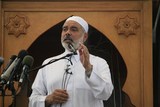
Deputy Head of Hamas’s Political Bureau Ismail Haneyya said Friday that his Movement is working seriously to lift the unfair Israeli siege on Gaza.
Haneyya told alkhaleejonline website, on the sidelines of Friday prayers, that Gaza was on the verge of a new positive stage as extremely important developments would take place in the near future.
Gaza siege will not be long in light of the extensive Palestinian efforts made at several levels to lift the blockade without any political price, he said.
“We do not want to go to a new war with the Israeli occupation; however, we seek to boost the Palestinian resistance to enable it deal with any possible threats.”
Earlier this week, Hamas and Israeli authorities officially announced that indirect negotiations between them were underway to stabilize calm and to negotiate the release of Israelis captured by Hamas in a possible new swap deal.
Israeli TV Channel 2 earlier revealed that Israeli authorities had appointed Lior Lotan at the head of a committee entrusted with negotiations for the return of the Israeli soldiers captured by Hamas.
The appointment came after Israeli Security Services admitted for the first time that two Israelis and two dead soldiers are being held captive by Hamas in the blockaded Gaza Strip.
Haneyya told alkhaleejonline website, on the sidelines of Friday prayers, that Gaza was on the verge of a new positive stage as extremely important developments would take place in the near future.
Gaza siege will not be long in light of the extensive Palestinian efforts made at several levels to lift the blockade without any political price, he said.
“We do not want to go to a new war with the Israeli occupation; however, we seek to boost the Palestinian resistance to enable it deal with any possible threats.”
Earlier this week, Hamas and Israeli authorities officially announced that indirect negotiations between them were underway to stabilize calm and to negotiate the release of Israelis captured by Hamas in a possible new swap deal.
Israeli TV Channel 2 earlier revealed that Israeli authorities had appointed Lior Lotan at the head of a committee entrusted with negotiations for the return of the Israeli soldiers captured by Hamas.
The appointment came after Israeli Security Services admitted for the first time that two Israelis and two dead soldiers are being held captive by Hamas in the blockaded Gaza Strip.

IDF soldiers whose bodies were snatched by Hamas during last year's Gaza war: Hadar Goldin and Oron Shaul
Over the years, Israel released some 7,500 Palestinian and Arab prisoners in return for 14 living Israelis and six bodies; these are the significant of the prisoner exchange deals.
Shortly after the story broke out that two Israelis were in Gaza - Ashkelon resident Avraham Mangisto and a Bedouin man - Israeli security officials were quick to say there will be no prisoner swap with Hamas for the two. It also appears there is currently no ongoing negotiation with Hamas for the two civilians, or for the bodies of two IDF soldiers killed in last year's war in Gaza.
Over the years, Israel has released some 7,500 Palestinian and Arab prisoners in deals made with the Palestinian Authority, Hamas and Hezbollah for the return of 14 living Israeli soldiers and civilians and six bodies.
During the previous Knesset, however, legislation by then-MK, now Justice Minister Ayelet Shaked was passed placing limitations on such prisoner exchange deals. According to the new legislation, the release committee cannot discuss the release of a prisoner who has served less than 15 years, and cannot recommend shortening the length of imprisonment to less than 40 years. Additionally, a prisoner convicted of murder with aggravated circumstances could not be freed as part of a future political deal.
The question remains of whether Israel will free more prisoners for the two civilians and the bodies of the two soldiers. Meanwhile, Ynet looked back at significant past deals to bring Israelis back home.
The Jibril Agreement
Over the years, Israel released some 7,500 Palestinian and Arab prisoners in return for 14 living Israelis and six bodies; these are the significant of the prisoner exchange deals.
Shortly after the story broke out that two Israelis were in Gaza - Ashkelon resident Avraham Mangisto and a Bedouin man - Israeli security officials were quick to say there will be no prisoner swap with Hamas for the two. It also appears there is currently no ongoing negotiation with Hamas for the two civilians, or for the bodies of two IDF soldiers killed in last year's war in Gaza.
Over the years, Israel has released some 7,500 Palestinian and Arab prisoners in deals made with the Palestinian Authority, Hamas and Hezbollah for the return of 14 living Israeli soldiers and civilians and six bodies.
During the previous Knesset, however, legislation by then-MK, now Justice Minister Ayelet Shaked was passed placing limitations on such prisoner exchange deals. According to the new legislation, the release committee cannot discuss the release of a prisoner who has served less than 15 years, and cannot recommend shortening the length of imprisonment to less than 40 years. Additionally, a prisoner convicted of murder with aggravated circumstances could not be freed as part of a future political deal.
The question remains of whether Israel will free more prisoners for the two civilians and the bodies of the two soldiers. Meanwhile, Ynet looked back at significant past deals to bring Israelis back home.
The Jibril Agreement

Grof, Salem, Shai return home
May 21, 1985: The Jibril deal is perhaps the most significant prisoner exchange deal in Israel's history. During the first Lebanon war, three IDF soldiers were captured - Yosef Grof, Nissim Salem, Hezi Shai - by the Popular Front for the Liberation of Palestine - General Command (PFLP-GC) led by Ahmed Jibril.
The fate of the three soldiers was unknown for a long time until the PFLP-GC admitted to having them. After long negotiations in Geneva, a prisoner exchange deal was made in which Israel agreed to release 1,150 terrorists for the three soldiers.
Among the freed prisoners were PA official Jibril Rajoub, who currently serves as the head of the Palestinian Football Association and the Palestinian Olympic Committee, and Sheikh Ahmed Yassin, a Gazan Muslim Brotherhood leader (and later spiritual leader of Hamas). Others included Ahmed AlAbras, one of the perpetrators of the 1979 Nahariya attack in which the Haran family and policeman Eliyahu Shachar were murdered, and Mohammad Shubaki who murdered Hadassah and Uriel Barak in Beit Guvrin in March 1979.
After the swap, then-IDF chief Moshe Levy said that the fact the soldiers were taken captive without resistance and by a much smaller force is unacceptable in the IDF, and considered prosecuting the soldiers. The soldiers denied the allegations attributed to them.
After Lebanon withdrawal, kidnapping in Mount Dov
May 21, 1985: The Jibril deal is perhaps the most significant prisoner exchange deal in Israel's history. During the first Lebanon war, three IDF soldiers were captured - Yosef Grof, Nissim Salem, Hezi Shai - by the Popular Front for the Liberation of Palestine - General Command (PFLP-GC) led by Ahmed Jibril.
The fate of the three soldiers was unknown for a long time until the PFLP-GC admitted to having them. After long negotiations in Geneva, a prisoner exchange deal was made in which Israel agreed to release 1,150 terrorists for the three soldiers.
Among the freed prisoners were PA official Jibril Rajoub, who currently serves as the head of the Palestinian Football Association and the Palestinian Olympic Committee, and Sheikh Ahmed Yassin, a Gazan Muslim Brotherhood leader (and later spiritual leader of Hamas). Others included Ahmed AlAbras, one of the perpetrators of the 1979 Nahariya attack in which the Haran family and policeman Eliyahu Shachar were murdered, and Mohammad Shubaki who murdered Hadassah and Uriel Barak in Beit Guvrin in March 1979.
After the swap, then-IDF chief Moshe Levy said that the fact the soldiers were taken captive without resistance and by a much smaller force is unacceptable in the IDF, and considered prosecuting the soldiers. The soldiers denied the allegations attributed to them.
After Lebanon withdrawal, kidnapping in Mount Dov

Adi Avitan's body returned to Israel
The IDF withdrew from southern Lebanon in 2000, 18 years after entering the hostile territory during the First Lebanon War. Only five months later, on October 7, 2000, Hezbollah kidnapped three soldiers patrolling the border fence in the Mount Dov area - Adi Avitan, Benny Avraham and Omar Souad. A week later, Hezbollah leader Hassan Nasrallah announced the organization was also holding Col. (res.) Elhanan Tannenbaum.
The IDF withdrew from southern Lebanon in 2000, 18 years after entering the hostile territory during the First Lebanon War. Only five months later, on October 7, 2000, Hezbollah kidnapped three soldiers patrolling the border fence in the Mount Dov area - Adi Avitan, Benny Avraham and Omar Souad. A week later, Hezbollah leader Hassan Nasrallah announced the organization was also holding Col. (res.) Elhanan Tannenbaum.

Elhanan Tannenbaum
For the three bodies and the Israeli civilian, Israel returned 60 bodies and 401 Palestinian prisoners to Lebanon, as well as four Lebanese soldiers to Hezbollah. Among the most significant figures released was Mustafa Dirani, the "head of security" of the Amal movement in Lebanon which was behind the capture of IAF navigator Ron Arad. Dirani, which Israel believed met face to face with Arad, was kidnapped in a daring Sayeret Matkal operation in 1994.
A decade later, however, he was released as part of the deal, along with senior Hezbollah member Abdal-Karim Obeid, who was also kidnapped by Israel.
The kidnapping that led to Second Lebanon War
July 12, 2006: Ehud Goldwasser and Eldad Regev were kidnapped in a Hezbollah raid on an IDF patrol. Three other soldiers were killed in the raid. Following the kidnapping, Israel launched the Second Lebanon War. Early on, assessments in Israel were that the two abducted soldiers were killed in the raid as well.
In June 2008, almost two years after the kidnapping, the Israeli government led by then-prime minister Ehud Olmert decided to approve a prisoner exchange deal to bring the bodies back for burial in Israel.
In that deal, 190 bodies of Hezbollah terrorists were returned to Lebanon, along with five terrorists, among them Samir Kuntar, who was the mastermind behind the murder of the Haran family and policeman Eliyahu Shachar.
Gilad Shalit returns home
For the three bodies and the Israeli civilian, Israel returned 60 bodies and 401 Palestinian prisoners to Lebanon, as well as four Lebanese soldiers to Hezbollah. Among the most significant figures released was Mustafa Dirani, the "head of security" of the Amal movement in Lebanon which was behind the capture of IAF navigator Ron Arad. Dirani, which Israel believed met face to face with Arad, was kidnapped in a daring Sayeret Matkal operation in 1994.
A decade later, however, he was released as part of the deal, along with senior Hezbollah member Abdal-Karim Obeid, who was also kidnapped by Israel.
The kidnapping that led to Second Lebanon War
July 12, 2006: Ehud Goldwasser and Eldad Regev were kidnapped in a Hezbollah raid on an IDF patrol. Three other soldiers were killed in the raid. Following the kidnapping, Israel launched the Second Lebanon War. Early on, assessments in Israel were that the two abducted soldiers were killed in the raid as well.
In June 2008, almost two years after the kidnapping, the Israeli government led by then-prime minister Ehud Olmert decided to approve a prisoner exchange deal to bring the bodies back for burial in Israel.
In that deal, 190 bodies of Hezbollah terrorists were returned to Lebanon, along with five terrorists, among them Samir Kuntar, who was the mastermind behind the murder of the Haran family and policeman Eliyahu Shachar.
Gilad Shalit returns home

Gilad Shalit returns home
Even before the Second Lebanon War broke out, another significant event occurred on June 25, 2006, when Hamas terrorists kidnapped an Armored Corps soldier in Kerem Shalom, Corporal Gilad Shalit.
Shalit was in Hamas captivity for five years, during which his family led a campaign both in Israel and abroad for his return. In October 2009, more than three years after the kidnapping, Hamas released a two and a half minutes long video in which Shalit is seen in uniform. This video was likely the trigger that sped up the deal to bring him home.
Two years later, Prime Minister Benjamin Netanyahu approved a prisoner exchange deal in which Gilad, who turned into a symbol in Israel, returned home in exchange for 1,027 Palestinian and Israeli Arab prisoners, including terrorists with blood on their hands.
Opponents of the deal said there was a possibility that some of these prisoners would return to terror activity. This fear was realized in June 2014, when Ziad Awad murdered Police Chief Superintendent Baruch Mizrahi, while the latter was on his way to celebrate Seder night in the Hebron area.
Some of those freed in the Shalit deal have already been re-arrested during Operation Brother's Keeper in 2014 launched after the kidnapping of thee Israeli yeshiva students.
Even before the Second Lebanon War broke out, another significant event occurred on June 25, 2006, when Hamas terrorists kidnapped an Armored Corps soldier in Kerem Shalom, Corporal Gilad Shalit.
Shalit was in Hamas captivity for five years, during which his family led a campaign both in Israel and abroad for his return. In October 2009, more than three years after the kidnapping, Hamas released a two and a half minutes long video in which Shalit is seen in uniform. This video was likely the trigger that sped up the deal to bring him home.
Two years later, Prime Minister Benjamin Netanyahu approved a prisoner exchange deal in which Gilad, who turned into a symbol in Israel, returned home in exchange for 1,027 Palestinian and Israeli Arab prisoners, including terrorists with blood on their hands.
Opponents of the deal said there was a possibility that some of these prisoners would return to terror activity. This fear was realized in June 2014, when Ziad Awad murdered Police Chief Superintendent Baruch Mizrahi, while the latter was on his way to celebrate Seder night in the Hebron area.
Some of those freed in the Shalit deal have already been re-arrested during Operation Brother's Keeper in 2014 launched after the kidnapping of thee Israeli yeshiva students.
SWAP - A - B - C - D - E - F - G - H - I - J - K - L - M - N - O - P - Q - R - S - T - U - V - W - X - Y - Z
